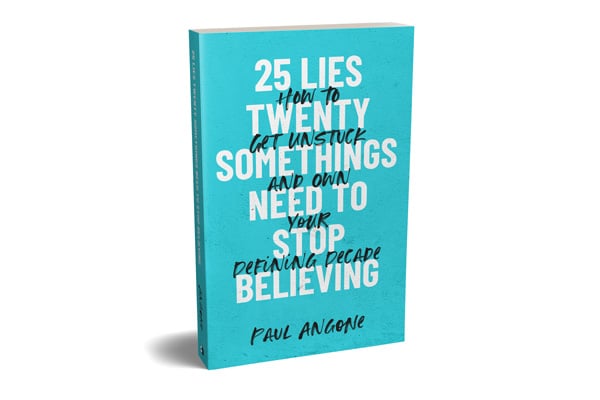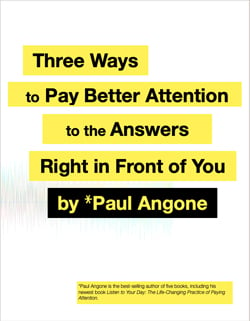So many people are talking about Millennials. Talking to Millennials. A very fine few are actually talking with us. (Bonus tip)
This article is for the parents, pastors, teachers, marketers, managers and leaders who are looking to engage, motivate, and meet this generation right where they are at in an authentic, meaningful way.
This article is also for every emerging adult who feels discouraged, diminished, and invisible — whether it be at home, in church, or in the office. (And maybe you want to covertly leave this article on the desk of the parent, manager, or pastor who is helping you feel this way).
Why am I the person to write this?
For years after college I lived the intensity, lostness, and overwhelming “what now?” of life in my twenties. The twentysomething transition process, that I can best describe as a season of breaking up with yourself, created in me the passion to help college students and twentysomethings learn the secrets to being successful in their twenties.
I’ve since written about the unique issues facing twentysomethings today for over 10 years. I’ve run AllGroanUp.com for nearly four years, writing hundreds of blogs encouraging and defining the unique struggles and problems specific to twentysomethings that have been read by millions of people in 190 countries.
I have extensively researched generational complexities in organizational settings while completing my Masters in Organizational Leadership. I speak at universities, non-profits, and businesses about issues relating to this topic. I also work individually with businesses, churches, and non-profits on how to engage, retain, motivate, and develop this next generation. Then finally I’ve written one best-selling book titled 101 Secrets For Your Twenties, and another book…(well more on that in a few weeks).
But more importantly than all of that — I’ve listened. I consider it one my greatest honors to receive emails every day from emerging adults who are calling for help, advice, and are searching for insight. And I’ve heard what they have to say.
So let’s get to it. Now what I’m going to write isn’t specific to this generation, or even true for the whole generation. But if you’re looking to engage a college student or twentysomething, here are seven strategies that I think will serve you well.

1. Stop Referring to Us So Much as “Millennials”
If you’re thinking and referring to the college students or twentysomethings in your classroom, office or home as Millennials, you’re already starting off on bad terms.
“Millennials” is marketing speak. It’s a broad-scope label, bound and gagged with so many stereotypes that it instantly puts bad tastes in everyone’s mouths.
Researchers will say Millennials are those born between 1980-2000, or 1983-2000, or 1985-1996, or…gosh who knows??
But the vast age range and the amount of change that has taken place within this span of time makes me offer a slight guffaw when trying to lump us all in together.
I was born in 1983. I made mixed tapes. I played Nintendo (and not because it was ironic). I didn’t have an email account until I was a sophomore in college. I didn’t have a cell phone until senior year of college. Yes I can remember exactly where I was when 9/11 happened, but I don’t think it became the collective generational rallying cry that events like the Great Depression, Pearl Harbor, Vietnam War, Civil Rights Movement, Woodstock, elicited.
Basically the vast array and scope of events, technologies, and individual experiences that have shaped this generation are too much to contain into the newest, scathing research article that polled 1,240 “Millennials”, so is somehow going to accurately describe all 80 million of us.
So stop with all the Millennial language. And stop with all the stereotypes. If you’re going to come at us with the angle of “entitled, narcissistic, and lazy” then that’s all you’re going to see.
Instead of referring to “those Millennials,” call them (enter their first names here)
2. Relationship First. Everything else Second.
Before you spell out office protocol. Before you ask for a volunteer, a sign up, or a purchase. Before you come downstairs with your agenda. Before you lay out the “this is how we do things here…” Even before that dreaded syllabus is handed out.
Build.A.Relationship.
Spend time with us before you try to lead us. Ask questions. Get to know our story and we will more receptively hear and understand yours.
3. Share Your Story (flaws and mistakes definitely included)
Whether you’re a pastor, a manager, a president, or a parent, I think you’d be surprised how interested the twentysomethings in your life are about your story. And not really about the successful parts.
No, they want to hear how you screwed up. How you don’t have it all figured out. How you’ve questioned, feared, and failed. They want to know what you’re currently wrestling with and the strategies you are using to overcome.
The age of the super-human leader with no flaws is dead.
Twentysomethings don’t want leaders who are super-humans, they want leaders who are super-human.
Have heart. And learn to speak from it. (tweet that)
Twentysomethings want leaders who can admit their mistakes, ask for forgiveness, confess weaknesses, can you look you in the eyes and actually talk to you beyond the latest status reports and deadlines. Beyond what your “title” at work says you deserve.
You know, an actual human.
Twentysomethings want to follow real people with real chinks in their armor who are still really moving forward.
They want someone they can trust and it’s your mistakes openly shared that become that great connecting point.
Vulnerability will beget vulnerability. Create a safe space for your college student or twentysomething to open up about their numerous fears by sharing a few of your own.
If you can’t honestly talk about your own struggle, then twentysomethings, honestly, won’t listen to your solution.
4. Create Community and Clarity (and yes don’t skimp on the positive re-enforcement in the process)
I hear from countless twentysomethings all over the world who feel lost, confused, directionless, and most of all ALONE. I repeat, the most common phrase I hear is “I feel all alone.”
If your twentysomething (possibly living back under your roof) seems unmotivated, I’d argue it’s not stemming from laziness; it’s coming from a lack of purpose and place. They don’t know where they’re going or how they’re going to get there, and the fear, failure, and overwhelming anxiety is suffocating them.
Can you help them create a vision for their life? Can you help them ask the important questions? Can you create a place where they really feel understood?
Can you create an environment that is fluid and flexible, that is more dedicated to the end goal than it is to policies, procedures, and “this is how we’ve always done things.”
As I wrote in my book 101 Secrets For Your Twenties, “The life of a twentysomething is that of a nomad. Picking up your tent and continually traveling to locate the herd and test the soil so that you can find the right place to land, the right place to call home.”
Can you create a place that feels like home? Can you create a work environment that gives a twentysomething room to grow, explore, be heard, and create?
If you make a twentysomething feel like they’re in a foreign country, they will continue to travel. (tweet that)
If you make a twentysomething feel more isolated, they will be looking for the quickest way to escape.
And yes, they don’t want you to hold back the affirmation in the process, if it’s authentic. Twentysomethings are struggling to figure out who they are and where they fit, and they could really use some positive affirmation from you. They will respond better to positive affirmation than they will to the negative or demeaning authoritarian leader.
5. Give Twentysomethings a Place at the Adult Table (and don’t surround it with a bunch of barriers and flaming hoops of fire to jump through)
Too many twentysomethings feel like they’re still sitting at the bright orange kids table using plastic sporks, while the real adults decide the important matters.
I think a twentysomething’s biggest fear is insignificance. They want to have a role in something bigger than themselves.
Leaders, managers, parents and pastors – let twentysomethings be a part of the bigger discussion.
Be confident enough in who you are as a leader to stop minimizing who twentysomethings are as followers and future leaders.
Sure twentysomethings don’t have the experience others do, but that doesn’t mean that they can’t give valuable input based on their strengths and experiences. They see problems from a different perspective, with a different lens.
Let them be heard and they will want to stay. Don’t put a two-year-long obstacle course in front of a twentysomething for them to prove their worth before they can open their mouths. Or they will just start running a different race.
But I can hear you now – the twentysomethings in my office think they know everything and won’t shut up about it!
Yes, the twentysomethings in your office might need to learn more tact, humility and how to be better listeners. But wouldn’t you rather have employees who care enough to voice their opinions and fight for them, than the employee who really stopped working for you five years ago and causes no ripples whatsoever because they stopped jumping in the water a long time ago?
6. Practice “To The Point” Communication
My generation wants you to get to the point.
Blame it on technology. Write about those dwindling attention spans.
But I think it’s because we’ve grown up in a world where we’ve had to learn to be proficient at mega-messaging-multi-tasking.
So many headlines. So many emails. So many blogs and books. So many texts, messages, tweets, you name it. When you’re sending a twentysomething a message – whether a work email, text, or article, they are mentally putting it on top of their stack of messages to hopefully get to later. Like a Hollywood producer with a mountain of scripts on their desk, your message better be sizzling and too the point if it’s hoping to rise to the top.
And writing a verbose email is not the way to do it.
Leaving a long voicemail is not the way to do it.
Having a bunch of meetings with numerous “key stakeholders” who all dance around the topic with verbal calisthenics, all trying to one-up each other with their verbal prowess, is not the way to do it. (I’ve been in too many of these meetings!)
For twentysomethings, death by meetings is a terrible way to die.
7. Paint the Bigger Picture (and give us a brush)
In your office, home, or classroom, paint the bigger picture of where things are headed and the importance of the different steps to get there. Then let this generation grab their brush and imagine what their role could look like within it.
Give them goals and assignments placed within the context of the bigger picture. Tell the story of where your organization is headed and let the college students and twentysomethings enter into it. Let them see the purpose, impact, and importance of the work, and you’ll be surprised at the passion and purpose twentysomethings bring to their jobs, to your church, and to your home.
I’d love to hear from you within the comments section on this article.
What do you think about these seven tips for engaging this generation?








Spot on, Paul. I can’t stand when people act like they’ve never screwed up in their careers. Put your flaws out there and show us how you learned from them.
Exactly! Thanks Danny
Really great insights and reminders, Paul. Thank you!
Thanks Sheri!
add to #1 that some of us “millennials” grew up in Africa and automatically do not fit into any of the ridiculous stereotypes about the generation LOL
Lol Kola! When I read “a place at the adult table” my relatives voices’ “go and play!” just rang like a thunderbolt.
But he’s right. And I wish they (those people) knew that.
The last time I had a leader who was invincible and flawless I could barely breathe…because my breath was sinful and I dare not alert him to my stinky breath! In all seriousness, leaders who play superheroes are contributing to the divide between “millennials” and leadership. Thanks for this, Paul!
Thanks Margaret! Well-said.
Yes! #3! I can’t help but to roll my eyes when I hear a boss/pastor/car salesman etc.. go on and on and on about how amazing and perfect they are then go straight into giving advice. I mean I know I’m not perfect…if you are so perfect, you clearly don’t understand me enough for your advice to mean much in my non-perfect life. It’s pretty funny when people put up a fake perfect front, and then expect you do open up to them!
Just found your blog and I have to say I feel like you are reading my mind! =)
Thanks Vivian! Well said. Really glad you’re finding All Groan Up helpful.
I’m a mom of 3 twentysomethings sons. Our life was full of hardships. I rise them almost alone. We always had ‘tell me your opinion ‘relationship. What happened now? I feel lost in translation. How to motivate them about their future? How to tell them that life is beyond computer screen? You said listen them,but they’re not allowing me in their life anymore. They trust people other side of screen. Do I failed?
Thanks Davia for your honest words. Really appreciate you sharing. No, you haven’t failed. There’s a season in the transition period of going from growing to grown where Millennials naturally pull more inward as they struggle to find their place and answer questions they are struggling with. As they see you support them and care for them through this difficult season, their trust in you will be even stronger. It’s definitely not easy.
Don’t refer to them as millineals? Ok, give you that one. No body is a super hero. Granted. We all make mistakes true. The gap here is that you should learn from you mistakes not continue to make. Appreciate the consequenc of the mistake. Don’t just blow it off as if it didn’t matter you made a mistake. We all make them not all of us are accountable for them.
To the point communication sounds good. That works as long as you can under all nuisances with an emoji or 144 character text.
Business is complex and sophisticated. Reading and writing skills are essential to be able to communicate insights to success and the big picture you refer to.
Vulnerability begets vulnerability. Don’t confuse vulnerability for weakness. Or mentors vulnerability for a lack of determination, “never give up”. Respect that value and respect will be given millennial or not.
Do I want this group to have an opinion? I want them to have an opinion that is earned as a result of their investment. The opinion doesn’t have to be right but does need to be earned. Baseless opinions are like elbows, everybody has two of them.
While one can appreciate the “feeling” aspect of their generation, it should be noted that in the event they don’t get their way, they might learn that others don’t always function as they do. In a vast world full of different age groups, it is imperative to be understood without being narrow minded. Not everything is about having a relationship, being the center of attention, erasing history because one is afraid of it, and just because it is flawed, and thinking 9/11 was just a minor event in their mind already says they are shallow and ill advised. They sound demanding, spoiled, and entitled..but entitled to what God only knows. LOL